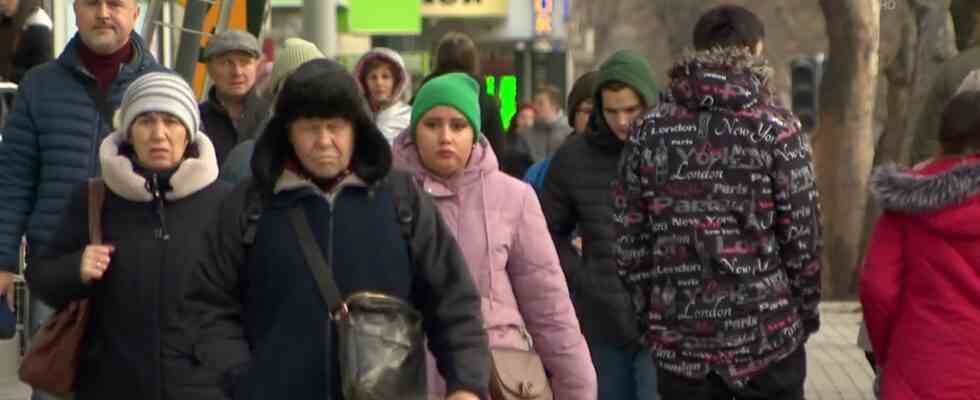Status: 02/16/2023 05:35 a.m
The Republic of Moldova is struggling for stability. Russia’s war against Ukraine is fueling fears, while at the same time high energy prices are putting a massive strain on the population. Making plans for the future – many do not see themselves in a position to do that.
The train creeps through the evening, an ancient model, heading west from Moldova’s capital Chisinau to Ungheni. For some commuters, like workers Elena, Valentina and Maria, it’s an arduous journey. Every morning they leave at around 5:30 a.m. and come home at around 7:30 p.m. – earning the equivalent of 200 euros a month.
Everything has simply become so expensive, Valentina Moraru describes her situation, for bread, oil or meat she sometimes has to pay five times the usual price.
Elena Dragoi also struggles with this. “Our salary is so small,” she says. Although wage increases are constantly being promised, she does not know when they will come.
Report Moldova: Threat from Russia
Sabine Krebs, WDR, daily topics 10:15 p.m., February 15, 2023
The most important economic factor: the foreign Moldovans
Moldova, the small country in the blind spot of south-eastern Europe, is one of the poorest on the continent. The republic was created in 1991 from the rubble of the Soviet Union.
Just 2.6 million people still live here. More than a million Moldovans are said to have left the country in recent years in hopes of better living conditions.
They have become an important economic factor because they send money back to their old homeland. But those who stayed are groaning under galloping inflation and rising energy prices. And the fear that the war in Ukraine could come to them too.
What the war in the neighborhood means
She never thought, says Tatiana Sarbu, “that there could be a war in our time.”
For Dragoș Scutelnicu, this means that he “can’t even make plans for tomorrow or the day after tomorrow”:
We think about what could happen in the evening, whether we’re still alive or running, or whether the mobilization begins. We just don’t know what will happen.
internal instability
Moldova is going through turbulent times: the government with Prime Minister Natalia Gavrilita resigned last week. Former Home Secretary Dorin Recean is now in charge of rebuilding.
And for months there have been repeated indications of targeted Russian influence. On Monday, pro-Western President Maia Sandu informed about secret service reports that Russia was planning a coup attempt. Last week, Ukrainian President Volodymyr Zelenskyy said at the EU summit in Brussels that his country had intercepted Russia’s plans to bring Moldova under Russian control.
There is alarm in Moldova, also because around 1,500 Russian soldiers are still stationed in the breakaway region of Transnistria. The feared scenario: A pro-Moscow government in Moldova could open up new strategic opportunities for Russia and significantly increase the pressure on southern Ukraine.
Western partners’ concerns
This also worries the western partners of Ukraine and Moldova. Because President Sandu’s pro-Western course is controversial in the country, also because pro-Russian forces are fueling criticism of her.
The western partners are trying to stabilize the country with financial aid. More aid was pledged for the small republic at a donor conference in Paris in November. In the summer, the EU made it a candidate for accession – another promise for the future.
The war crosses borders
But for now, war is very near. 68-year-old Olga Zhereblovskaya felt the effects on her own doorstep. In the north-east of Moldova, in Naslavcea directly on the border with Ukraine, fragments of a Russian missile shot down by the Ukrainian air defense system fell down last year:
The explosion was “really scary,” says Zhereblovskaya, “I thought that that’s it, that’s the end of the world”.
Russia has repeatedly violated Moldova’s airspace. Most recently last Friday when a rocket is said to have appeared near the Ukrainian border. According to the Foreign Ministry, the Russian ambassador in the capital Chisinau was therefore summoned.
Where to go when fighting reaches Moldova?
When the commuter Elena arrives home in the evening, the first thing to do is heat – with wood. Electricity costs eat up their income. It’s now 40 euros a month, a fifth of her income.
But what worries her most that evening is her fear of the future. Because where, Elena asks, should she go when war comes to Moldova – after all, nobody is waiting for her.
She and her fellow commuters hoped for peace all the more, like most people in Moldova. They toast it with homemade wine. Before your train leaves for Chisinau tomorrow morning.

